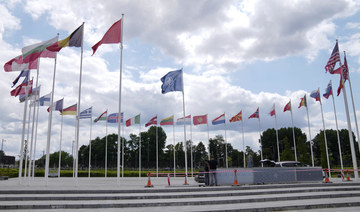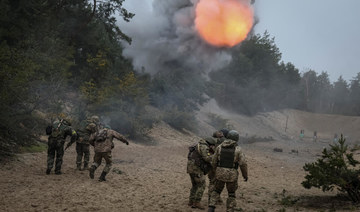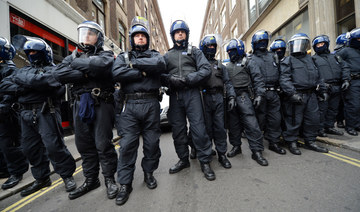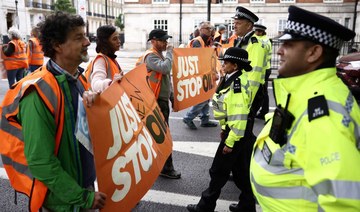VILNIUS: Lithuania declared more than a thousand citizens of Russia and Belarus living in the country to be threats to national security on Friday and said it was stripping them of their permanent residency permits.
The decision comes after the government asked the Russians and Belarusians to answer a questionnaire that included questions about their views on Russia’s invasion of Ukraine and the status of Crimea, the Ukrainian territory which Russia illegally annexed in 2014.
Lithuania, a Baltic nation that declared its independence from the Soviet Union more than 30 years ago, is a democracy that belongs to NATO and the European Union. It has been a strong backer of Ukraine and also a place of refuge in recent years for many who have fled an authoritarian crackdown in neighboring Belarus and increased repression in Russia.
The Migration Department said Friday that it had established that 1,164 Belarusian and Russian citizens residing in Lithuania posed a threat to national security, a decision that was based on an evaluation of public and non-public information. It said 910 of those were Belarusian citizens and 254 Russian citizens.
How people answered the questionnaire was taken into consideration in deciding whether to grant or deny residence, according to the Migration Department, the government office that carried out the survey.
Those deemed to be national security threats are only a fraction of the Belarusians and Russians living in Lithuania. According to the Migration Department, more than 58,000 Belarusian citizens and 16,000 Russian citizens are currently residing in Lithuania. They are required to renew their residence permits every year to three years, depending on the application status.
Those stripped of permits can appeal the decision in court. Others will have up to a month to leave the country, according to the Migration Department.
There was no immediate reaction from the Russian or Belarusian governments.
Viktor Voroncov, a businessman who moved from Russia several years ago, learned Lithuanian and obtained citizenship, said he agreed with the move.
“I know many Russians who served in the Soviet and later in Putin’s army. They are married to Lithuanian wives, they live here, maintain close contacts with comrades in arms back in Russia and are spreading Kremlin propaganda constantly,” Voroncov said.
“Lithuania is a democratic country and tolerates different views. Even their propaganda was OK until the war started, but things have changed and they must go,” he said.
Lithuania also has an ethnic Russian minority that makes up about 5 percent of the population. They are citizens of Lithuania and were not required to answer the questionnaire.
Lithuania declares more than 1,000 Belarusians and Russians to be national security risks
https://arab.news/pe57w
Lithuania declares more than 1,000 Belarusians and Russians to be national security risks
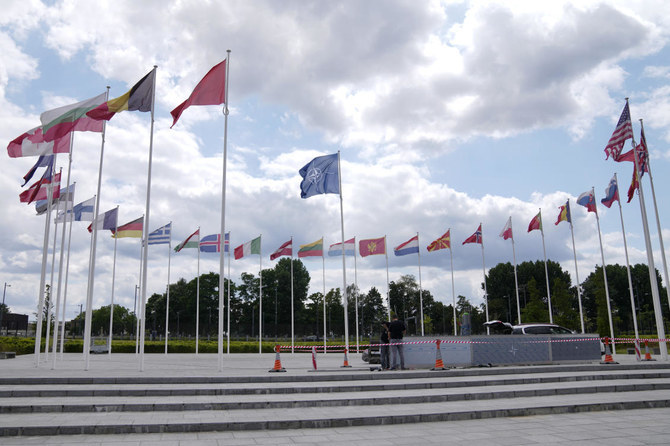
- The decision comes after the government asked the Russians and Belarusians to answer a questionnaire that included questions about their views on Russia’s invasion of Ukraine
- Lithuania is a democracy that belongs to NATO and the European Union
Police break up pro-Palestinian camp at the University of Michigan

The encampment had been set up in late April near the end of the school year
MICHIGAN: Police broke up a pro-Palestinian encampment Tuesday at the University of Michigan, less than a week after demonstrators showed up at the home of a school official and placed fake body bags on her lawn.
Video posted online by Detroit-area TV stations showed police moving people away from the camp on the Diag, a common site for campus protests. The encampment had been set up in late April near the end of the school year.
President Santa Ono said in a statement that the encampment had become a threat to safety, with overloaded power sources and open flames. Organizers had refused to comply with requests to make changes following an inspection by a fire marshal, he said.
“The disregard for safety directives was only the latest in a series of troubling events,” Ono said.
Protesters have demanded that the school’s endowment stop investing in companies with ties to Israel. But the university insists it has no direct investments and less than $15 million placed with funds that might include companies in Israel. That’s less than 0.1 percent of the total endowment.
“There’s nothing to talk about. That issue is settled,” Sarah Hubbard, chair of the Board of Regents, said last week.
A group of 30 protesters showed up at her house before dawn last week and placed stuffed, red-stained sheets on her lawn to resemble body bags. They banged a drum and chanted slogans over a bullhorn.
Masked protesters also posted demands at the doors of other board members.
“This conduct is where our failure to address antisemitism leads literally — literally — to the front door of my home,” board member Mark Bernstein, a Detroit-area lawyer, said at a board meeting last week. “Who’s next? When and where will this end? As a Jew, I know the answer to these questions because our experience is full of tragedies that we are at grave risk of repeating. Enough is enough.”
Students and others have set up tent encampments on campuses around the country to press colleges to cut financial ties with Israel. Tensions over the war have been high on campuses since the fall, but demonstrations spread quickly following an April 18 police crackdown on an encampment at Columbia University.
UK announces compensation package for blood scandal victims
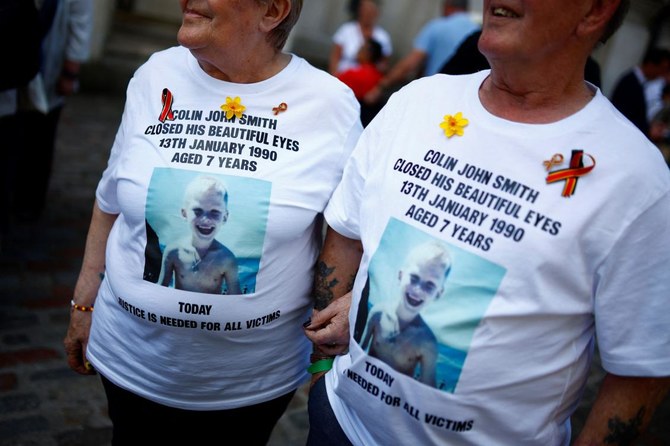
- Damning report blames successive governments, officials and doctors for failures that resulted in more than 3,000 deaths
LONDON: Britain said on Tuesday it would begin making further interim compensation payments to the victims of the contaminated blood and blood products scandal.
“The government will be making further interim payments ahead of the establishment of the full scheme,” minister John Glen told parliament, a day after a damning report blamed successive governments, officials and doctors for failures that resulted in more than 3,000 deaths.
“Payments of 210,000 pounds will be made to living infected beneficiaries,” he added.
Prime Minister Rishi Sunak made a “wholehearted unequivocal apology for this terrible injustice” on Monday, adding that those affected would receive “comprehensive compensation.”
More than 14,000 displaced from Ukraine’s Kharkiv region: WHO

- WHO official in Ukraine: Conflict in Kharkiv ‘has significantly increased the number of trauma patients’
- UNHCR voices concerns that conditions in Kharkiv could become even more difficult if the ground assault and aerial attacks continue
GENEVA: More than 14,000 people have been displaced in recent days from Ukraine’s eastern Kharkiv region, where Russia launched a ground offensive on May 10, the World Health Organization said Tuesday.
The assault has seen Russian forces achieve their largest territorial gains in Ukraine in the last 18 months.
“Over the past two weeks, fighting in the Kharkiv region of Ukraine has severely escalated,” Jarno Habicht, the WHO’s representative in Ukraine, told a press briefing in Geneva, via video-link from Kyiv.
“Over 14,000 people have been displaced in a matter of days, and nearly 189,000 more still reside within 25 kilometers of the border with the Russian Federation, facing significant risks due to the ongoing fighting,” he said.
He said the UN health agency was using these figures after speaking with local authorities.
“With the worsening security situation, humanitarian needs in the region are growing, and growing fast,” Habicht said.
The conflict in Kharkiv “has significantly increased the number of trauma patients,” he added.
Russia launched its full-scale invasion of Ukraine in February 2022.
Since then, more than 20,000 amputations have been carried out, said Habicht.
And 200 ambulances per year, on average, have been damaged or destroyed in shelling attacks, “depriving the Ukrainian people of urgent care,” he added.
The UNHCR voiced concerns that conditions in Kharkiv — already home to 200,000 internally displaced people — could become even more difficult if the ground assault and aerial attacks continue.
“UNHCR, the UN refugee agency, is extremely worried about the worsening situation and resulting spike in humanitarian needs and forced displacement owing to the new ground offensive,” spokeswoman Shabia Mantoo told the Geneva briefing.
She said the Ukrainian authorities had evacuated more than 10,300 people from villages in the Kharkiv region’s border areas, while others have left by their own means.
“The majority of the evacuees, who had to escape their homes with only a few belongings, are already highly vulnerable and include mainly older people and those with low mobility or disabilities who were not able to flee earlier,” Mantoo said.
Those registered at a transit center in Kharkiv city have been given basic relief items and advised on accommodation options.
“The vast majority of evacuees have expressed a clear wish to stay with family members or in rental accommodation and collective sites in Kharkiv and not move further from their homes, to be able to return when the situation allows,” Mantoo said.
The United Nations’ 2024 humanitarian plan for Ukraine amounts to $3.1 billion this year. UN spokeswoman Alessandra Vellucci said that it was thus far only 23 percent funded.
1 dead, others injured after London-Singapore flight hit severe turbulence, Singapore Airlines says

- The airline said the aircraft was a Boeing 777-300ER with a total of 211 passengers and 18 crew on board
BANGKOK: Singapore Airlines says a person has died aboard and others were injured when a London-Singapore flight encountered severe turbulence.
Singapore’s Flight SQ321 from Heathrow was diverted to Bangkok and landed at 3:45 p.m. local time at Suvarnabhumi Airport, the airline announced in its Facebook page. The airline said the aircraft was a Boeing 777-300ER with a total of 211 passengers and 18 crew on board.
Local emergency crews from Samitivej Srinakarin Hospital were on site to transfer injured people off the runway for treatment. Videos posted on the LINE messaging platform by Suvarnabhumi Airport showed a line of ambulances streaming to the scene.
Britain’s new protest laws unlawful, London court rules in rights group’s challenge

- Civil rights group Liberty took the government to court over changes to public order laws made last year
- Judge rules new regulations gave the police almost unlimited powers to shut down protests
LONDON: Britain unlawfully gave police wider powers to impose conditions on peaceful protests which cause “more than minor” disruption to the public, London’s High Court ruled on Tuesday.
Civil rights group Liberty took the government to court over changes to public order laws made last year, which it says gave the police almost unlimited powers to shut down protests.
The case was heard in February amid a wider crackdown on protest movements in Britain and across Europe, as environmental activists have used direct action protests to demand urgent government action against climate change.
Judges David Bean and Timothy Kerr ruled in the group’s favor on Tuesday, finding that the regulations granting the new powers were unlawful.
The High Court granted the government permission to appeal and suspended its decision that the new powers should be quashed pending the outcome of the appeal.
Liberty’s legal action focused on the Public Order Act, under which the police can impose conditions on a protest if it could cause “serious disruption to the life of the community.”
The law was amended last year, so police could impose conditions in cases where a protest could cause “more than minor” disruption, which Liberty said was unlawful.
Government lawyers argued that ministers were given express powers to amend the law on what amounted to serious disruption.
But the High Court ruled that the government exceeded its powers, which “did not extend to lowering the threshold for police intervention.”



